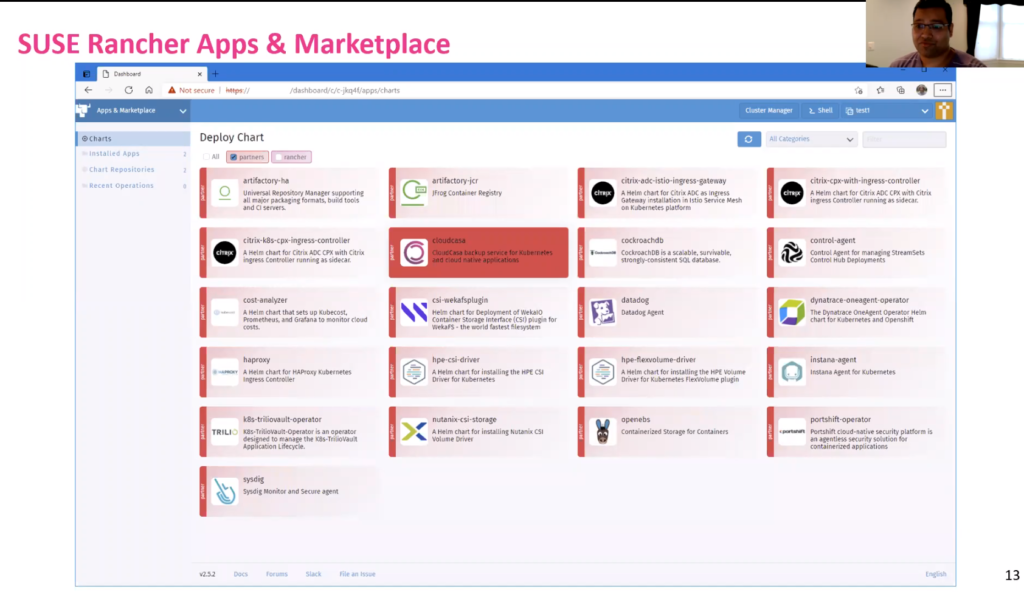Kubernetes and Cloud Database Protection as a Service
CloudCasa™, a simple, scalable, cloud-native data protection service that supports all leading Kubernetes distributions and managed services, is now generally available through the SUSE Rancher™ Apps & Marketplace. With increasing adoption of cloud database services, CloudCasa adds cloud database support starting with Amazon RDS to its Kubernetes data protection service – addressing both Kubernetes and RDS support in a single data protection service. Webinar Recap – What’s new in CloudCasa? We went live with CloudCasa beta during the KubeCon + CloudNativeCon 2020 digital event. We recently announced for SUSE Rancher and Amazon RDS. By logging into CloudCasa at cloudcasa.io and registering an account using our free tier of service, you can now not only take snapshots of your CSI volumes, but you also can perform snapshots of your Amazon RDS databases and optionally copy them to another region within you AWS infrastructure. During the webinar, Sathya Sankaran, the COO of Catalogic Software, discussed these new capabilities. In the diagram below, he showed the SUSE Rancher Apps & Marketplace and how the CloudCasa agent can be installed on Rancher managed clusters from the Helm and connected to the CloudCasa data protection service.
Webinar Q&A
At the end of the webinar, Bob Adair, the CloudCasa product manager, and Sathya addressed questions from the audience, as follows:
What is your plan for supporting additional cloud databases, such as Azure and SQL?
We are seeing a very high adoption rate of cloud databases from Kubernetes users. In our view, they are part of the same ecosystem. Therefore, a backup service can’t support one without supporting the other. In fact, it was a need that came up using our own service given we use cloud databases for hosting some of our data from the cloud service.
We are a Kubernetes application, but our persistent data is sitting on a cloud database. When we were looking at protecting our own workloads, we realized that there was a massive gap in terms of what we must provide. That was our driver for building Amazon RDS support first, because we were using it to drive our services. We see this as the first entry, but not the last, only the starting point for supporting additional cloud databases in Q2.
We would love to hear preferences from users. If you would like to share your opinions and feedback, please feel free to join the CloudCasa online forum.
Why should I use CloudCasa for Amazon RDS when AWS already has an automated backup feature?
In AWS there are a lot of good reasons to segregate your infrastructure across several accounts. That implies that we often create multiple accounts for multiple teams and all of them have some cloud usage. Our service allows you to bring the management of Kubernetes and cloud database protection into a single place. We are the only solution that supports both Kubernetes and cloud databases in a single platform. There are other competing services that delivers Kubernetes or cloud databases.
CloudCasa was built to create air gapped solutions that allow you to protect your backup copies in a different access domain or cloud provider. That is not necessarily what cloud providers will give you today, because they have no incentive to allow you to backup a copy. Backup is an insurance industry, and you wouldn’t want your Ford car insured by Ford insurance. You would want that to be through a third party that has no conflict of interest. In this case, our service will treat all cloud providers the same, and allow data mobility between different cloud providers. That’s very important in the world of data insurance.
CloudCasa also allows you to:
- Define schedule and retention policies – applied across your infrastructure whether it is a database or containers residing inside of Kubernetes.
- Central view of the protection of your database, regardless of what provider, account, or region they’re in.
When will CloudCasa be available for Red Hat OpenShift?
It is available for OpenShift today and OpenShift clusters are being protected today by CloudCasa. If your question is, do you have CloudCasa available through the Red Hat Marketplace as an operator? That work is ongoing, and we are creating and certifying an operator for OpenShift customers that they’ll be able to deploy through RedHat’s Marketplace.
Your Next Step
Please give CloudCasa a try today and let us know what we can do to further support your cloud native applications. Did you miss the CloudCasa webinar? Don’t worry, you can view a recording of it here. If you have any further questions please email us at casa@cloudcasa.io